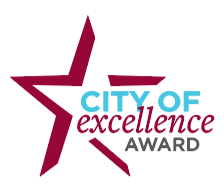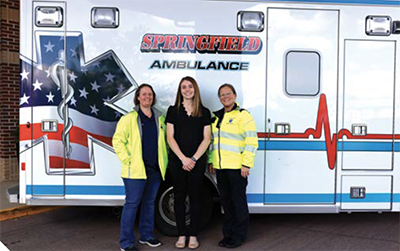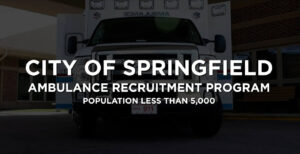Plea to City Council Spurs Revival of Springfield Ambulance Service

By Andrew Tellijohn
Erin Nelson was stressed out when she wrote a letter that she later read to the Springfield City Council late last fall.
She was one of just a handful of crew members left on the local volunteer ambulance service. Nelson and her colleagues, including Ambulance Coordinator Paula Thomas, were working nights, weekends, and holidays, missing family events in the process, to keep local service alive as much as possible.
“At that point, a lot of the staff was getting into burnout stage,” Thomas said. “That’s definitely not where you want your EMS staff.”
As it was, the city was already relying on out-of-town help from neighboring ambulance services in Sleepy Eye and Wabasso to help cover their calls during the day.
The remaining crew had tried several times previously to recruit new people, going on door knocking events, handing out flyers, and hosting meet-andgreets, but attendance had been low and response minimal.
“We had been short of crew members for quite a while,” Nelson said. “We really hadn’t been getting anywhere with doing different things to recruit people.”
But when her letter was read at the council meeting and word got out that the service might be months from shutting down, the city sprung to action.
Jumping right in
As this issue was coming to the forefront, Amber Dale was joining the city in September 2023 as its new city manager. As she started her job, her first priority was preparing a new budget for a meeting the following week. Her second was helping rebuild the ambulance service.
She started by listening to Thomas and learning the laws and finances relating to the volunteer service.
“There was a lot of learning to be done before we could really do anything,” Dale said.

Then, collaboratively, behind the scenes, they started kicking around ideas.
“We made a plan and that was basically to bring a policy to the Council that would allow city staff to go out on ambulance calls and train to be on the ambulance during the daytime,” Dale said, adding that none of the proposed changes were brought up to council members or publicly until the necessary training sessions had been set up and members of the city staff had confirmed they had interest.
“Then we jumped in with two feet,” Dale added. “We had the ambulance crew members write a letter to the Council, pleading with them and saying they’re tired and if we don’t do something, the service is not going to be here in six months.”
Then they took several other actions, which included:
- Creating a series of informational social media posts and engaging Community Development Director Heidi Wersal to reach out to the business community to see if they would follow suit.
- Collaborating with the local newspaper on a story about the consequences should local ambulance service go away.
- Reaching out to Springfield High School to see if any students wanted to learn the trade.
- Contacting neighboring communities to see if anyone would like to add some shifts.
“We touched every avenue we could think of in our area,” Thomas said. “We went to every corner and cried out for help and said, ‘You know, an ambulance service is not guaranteed. In rural Minnesota, in rural anywhere, an ambulance service is not guaranteed.’”
The city proposed reducing the required monthly work hours from 80 to 48 and loosening tight response time requirements a bit from past recruitment efforts to make it easier to qualify for the job.
“There were a lot of people in town that had wanted to join the service in the past, but they didn’t think they could meet the requirements,” Dale said. “You had to be on the truck within like five minutes. That cut off anyone that lived right outside the town.”
Finally, a call to Ridgewater College created a partnership through which emergency medical responders, who can do initial assessments but not transport patients on their own, could train to become emergency medical technicians.
Staff brought it to the Council in December 2023 with the intent of starting training sessions in January — offering both a session during the workday, and sessions in the evenings and on weekends for flexibility.
“It was really great to see everyone come together,” Dale said. “We brought it to the Council in December and the training started in January.”
Impressive response
Springfield’s efforts paid off quickly and dramatically. Several businesses allowed interested employees to train and go on call during their work hours. Two high school students signed up to take the training courses and learn the trade. And several workers from adjacent communities agreed to take on additional volunteer responsibilities, city sources said. The efforts have also earned a 2024 City of Excellence Award from the League of Minnesota Cities.
Dale said they collectively hoped to add a handful of people, maybe get the roster up to 10. Instead, momentum grew far beyond expectations and the roster now sits at 26.
Nelson, a medical coder for 20 years by trade, said she’s typically not a comfortable public speaker, but she’s proud to have played a role in rejuvenating the ambulance service. The consequences of shutting down the ambulance service would have been further reliance on other communities, which would include longer wait times, ambulance service officials said.
When Nelson wrote the letter, which was subsequently read to the Council, the information set the community in motion.
“Now we have new issues,” Dale quipped. “They’re fighting over the schedule. They all want to be on calls. We have almost too many people. But that’s a good problem to have.”
That said, they’re not turning anyone away. The training budget for the year, aided by a one-time boost from the Legislature, has been spent and they’re waiting on additional funds. But they’re going to continue training new people. Classes are scheduled into the fall.
“We decided we are not going to turn anyone away who wants to be one in case some people decide it’s not for them,” Dale said. “A lot of times, people don’t know what they’re getting into.”
Business community buy-in
Several business leaders in town bought in, allowing their employees to train and take shifts during work hours. One, Paul Pieschel, is president of Farmers & Merchants Bank and F&M Insurance Agency, both in Springfield. After taking a call from Wersal, Pieschel was on board when two of his employees wanted to join the ambulance force.
It’s good for the community and it fits within the bank’s values, he said.
“One of the core values of the bank that I expect from all my employees is community involvement,” Pieschel said. “We encourage it. I had a couple of staff inquire about it and I said, ‘Yes, absolutely. That is something the community needs.’”
The employees have been called out of work midday a couple times since joining up and he’s OK with that. He trusts them to get their work done at other times. The bank has had a couple people on the ambulance crew in the past.
“They’ve since retired, but we have set that precedent years ago allowing them to be part of the crew,” Pieschel said. “It’s a challenge. We need the next generation. Everybody has to step up in order to be able to offer services in the community. I applaud them for being willing to step forward.”
Going forward
Staffing is now more than sufficient, but that doesn’t mean Springfield is going to stop recruiting. Several of the half-dozen ambulance staff who were with the team when its push began are approaching retirement, and Thomas doesn’t want to see the city in the same position down the road.
“We continuously put ads out there saying, ‘This is where we are at,’” she said. “We definitely have reports that go to our City Council meetings. From this point forward, having that public eye is going to be more beneficial to our smalltown services.”
She’s proud of the work she and city staff put into the recruitment efforts, and of how the community pulled together once it learned it could be on the verge of losing the service altogether. She also credited Mark Griffith, executive director of South Central Minnesota EMS System, for providing the city with ideas and accompanying staff on a door knocking campaign.
“We love the City of Springfield and we’re volunteering for all of our patrons, we’re volunteering for our neighbors and families,” Thomas said. “We just need help. That was the big push we put out there. And that really perked people up.”
Meanwhile, Nelson is relieved because she can now attend her kids’ activities without worry.
“It’s kind of nice that we have the extra crew members so I don’t have to worry about taking off at 2:30 or 3 p.m. to get over to a tennis meet that is an hour-and-a-half away, because we have people now,” she said. “Before, that was always a struggle.”
Andrew Tellijohn is a freelance writer.


